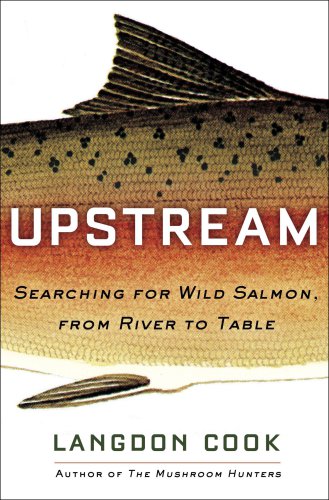
Upstream
Searching for Wild Salmon, from River to Table
کتاب های مرتبط
- اطلاعات
- نقد و بررسی
- دیدگاه کاربران
نقد و بررسی

April 24, 2017
In this insightful book, Cook (The Mushroom Hunters) clearly outlines scientific information about the species of fish commonly known as salmon, giving details on the salmon’s life cycle, distribution, preferred habitat, and physical appearance. But the focus here is less on facts and research and more on how “Pacific salmon culture in North America is a dance between fish and humanity.” Cook connects with chefs, fishermen, ecologists, fish wranglers, reef netters, Native Americans, a “bearded masturbator of fish,” and countless others to get their perspectives on the state of dwindling salmon stocks and the impact on them of fish hatcheries, commercial fishing, dam building/removal, and wildlife conservation. The answers can be a little depressing at times, especially considering that the salmon’s troubles are almost exclusively man-made. But Cook also finds a lot of hope for salmon’s recovery in places such as the Elwha River in Washington State, where dams had been removed; in Seattle’s urban pink-salmon fishery, the Duwamish River; and in experiments such as the Nigiri Project, which ties flooding for sushi-rice production to increased California salmon habitat. In the end, Cook acknowledges that salmon’s recovery, just like its demise, will come from people. As one set-in-his-ways rancher tells Cook, “It’s gonna take a while. Because a bunch of people my age still need to die.” That may be the case, but for those who want to live to see the salmon recapture its former glory, this work is a great place to learn what needs to done—and an entertaining view on the positive and negative connections human have with the natural environment.

May 1, 2017
A tale of a species on life support and the ramifications for people, nature, and place.While Cook's (The Mushroom Hunters, 2014, etc.) earliest memories of salmon stem from his New England childhood, he first encountered them in the wild during summer swims in Oregon's Rogue River. He was in his early 20s and had moved across the country to take care of a remote homestead in the mountains. Drawn to the wild as a source of rejuvenation and sustenance, the author learned to fish for salmon and to ponder their relationship to people and place. Intoxicated, he began pulling at a thread that would take him on a journey across the Pacific Northwest, including stops at Seattle's Pike Place Market, the country's first sustainable sushi restaurant, a state forestry meeting, a First Foods ceremony, fish hatcheries, dammed rivers, and gill-netting operations. Cook was guided along the way by a diverse, colorful cast of characters, including ecologists, conservationists, activists, chefs, restaurateurs, commercial fishermen, and others, each sharing their stories, politics, passions, and philosophies on the state of the world and pathways for the future. Exposing striking human-salmon parallels, these stories tell of settlement and cultural clashes, of life cycles and migrations, of deforestation and industrial agriculture, of racism and gentrification, and Cook skillfully illustrates the interconnectedness of it all. Seeking the wild in a landscape fraught with man-made alteration and annihilation, the author interrogates the nature of wildness, posing urgent, provocative questions. Can we disentangle human and natural landscapes? Is it possible to restore nature? Can humans move from markets and mitigation to reconciliation with nature and with each other? If we know better, will we do better? How might we imagine new ways of living and being in the world? Blurring boundaries and complicating the oversimplified, Cook provides a moving, artfully layered story of strength and vulnerability, offering glimpses of hope for growing humility and reverence and for shifting human-nature relationships.
COPYRIGHT(2017) Kirkus Reviews, ALL RIGHTS RESERVED.

May 1, 2017
Salmon have been prized for food and admired by many cultures for their remarkable migration pattern from rivers to oceans and back to the rivers of their origins. Cook (The Mushroom Hunters; Fat of the Land), who writes about wild foods and the outdoors and leads hikes in the Seattle area, starts his salmon journey at the Copper River in Alaska. He continues on to visit the fishing community of Cordova, AK, and explores the Rogue and Columbia Rivers in Oregon and Washington State, the Sacramento River system in California, and the Snake River in Wyoming. The author describes the species of wild Pacific salmon and the negative effects on their populations caused by logging, warming river and ocean temperatures, and the damming of rivers to provide hydroelectric power and irrigation. He further argues that habitat destruction, human population growth, and the effects of salmon hatcheries have altered the ecosystems on which the fish depend. Throughout, Cook deftly conveys his love of nature, the beauty of the Pacific Northwest, and the delectable eating provided by fresh caught wild salmon. VERDICT Fishers, environmentalists, naturalists, and armchair travelers will enjoy this passionate and well-written account, as will fans of Catherine Schmitt's The President's Salmon.--Judith B. Barnett, Univ. of Rhode Island Lib., Kingston
Copyright 2017 Library Journal, LLC Used with permission.

























دیدگاه کاربران